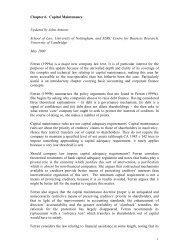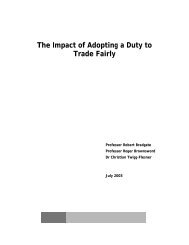From Exuberant Youth to Sustainable Maturity - DTI Home
From Exuberant Youth to Sustainable Maturity - DTI Home
From Exuberant Youth to Sustainable Maturity - DTI Home
Create successful ePaper yourself
Turn your PDF publications into a flip-book with our unique Google optimized e-Paper software.
The core focus of our analysis was on issues facing<br />
development and publishing. However, in order <strong>to</strong><br />
understand the issues facing these sec<strong>to</strong>rs we also<br />
examined a number of other players in the value<br />
chain (see below).<br />
Exhibit 40: The games industry value chain<br />
Licence holder<br />
Platform owner / console<br />
manufacturer<br />
Middleware & services company<br />
Developer<br />
Financial institutions<br />
Recruitment<br />
Training education<br />
Lawyers<br />
Technology suppliers<br />
Other services<br />
Agent<br />
Source: Spectrum analysis<br />
Publisher<br />
This section thus examines the key characteristics<br />
and the main challenges faced by players in the UK<br />
games industry:<br />
• Development<br />
• Publishing<br />
• Middleware and <strong>to</strong>ols<br />
• Outsourcing and services companies<br />
• Format holders / console manufacturers<br />
• Distribu<strong>to</strong>rs<br />
• Retailers<br />
4.1 Development<br />
Peripherals<br />
manufacturers<br />
Distribu<strong>to</strong>r<br />
Key:<br />
The UK development sec<strong>to</strong>r was effectively born out<br />
of the Sinclair Spectrum phenomenon of the 1980s.<br />
This low-cost programmable computer quickly<br />
gathered a large following of programming<br />
enthusiasts - a hobbyist bedroom development<br />
culture was created that encouraged the<br />
development of new programming skills, combining<br />
technical savvy with creative ideas.<br />
A<br />
B<br />
C<br />
D<br />
Retailer Consumer<br />
Core value chain - Not interviewed<br />
Core value chain - Interviewed<br />
Core value chain - Focus of study<br />
Peripheral <strong>to</strong> value chain - Interviewed<br />
DETAILED UK SUB-SECTOR REVIEW<br />
4.1.1 Sec<strong>to</strong>r structure and employment<br />
The UK development sec<strong>to</strong>r employs over 6,000<br />
people 33 , more than twice as many as any other<br />
European country and is now the largest, and<br />
arguably the most successful, European<br />
development community.<br />
Exhibit 41: Number of people employed in computer<br />
games development in European<br />
terri<strong>to</strong>ries (2000)<br />
500<br />
Benelux<br />
33 Source: Screen Digest - Interactive leisure software, market assessment and forecasts <strong>to</strong> 2005<br />
34 Source: Spectrum analysis based on Screen digest data<br />
35 Source: Spectrum analysis based on Screen digest data<br />
2,620<br />
France<br />
580<br />
Germany<br />
Source: Screen Digest – Interactive leisure software, market assessment and<br />
forecasts <strong>to</strong> 2005<br />
The development sec<strong>to</strong>r comprises over 270 studios,<br />
is divided between the independent studios and<br />
those owned and operated by the publishers. There<br />
is also a natural division between the smaller<br />
developers and those with substantial scale. The<br />
majority of the development community is employed<br />
in small <strong>to</strong> medium sized independent studios with<br />
an average of 22 employees 34 . These studios often<br />
only have the resources <strong>to</strong> work on one project at a<br />
time and may supplement revenues with conversion<br />
work (re-writing a game originally released on one<br />
platform for another, e.g. from Playstation 2 <strong>to</strong> PC).<br />
There are, however, approximately eleven large,<br />
more experienced independent developers that<br />
employ over 100 people 35 . This greater scale<br />
enables them <strong>to</strong> run a number of development<br />
projects simultaneously, increasing the likelihood that<br />
they will obtain royalties from at least one of the<br />
projects and mitigate the risks of a project being<br />
cancelled. They also benefit from economies of scale<br />
from sharing development <strong>to</strong>ols, technologies, and<br />
organisational systems and processes. These<br />
developers have established reputations and have<br />
typically produced successful titles with a volume of<br />
sales sufficient <strong>to</strong> support future development<br />
investment and enabling them <strong>to</strong> obtain better terms<br />
on successive deals. This success has enabled<br />
some of these larger developers <strong>to</strong> gain access <strong>to</strong><br />
external sources of finance <strong>to</strong> fund growth plans<br />
(e.g. Argonaut and Warthog).<br />
Competitiveness analysis of the UK games software sec<strong>to</strong>r Main report 33<br />
200<br />
Italy<br />
900<br />
Scandinavia<br />
300<br />
Spain<br />
6,000<br />
UK
















